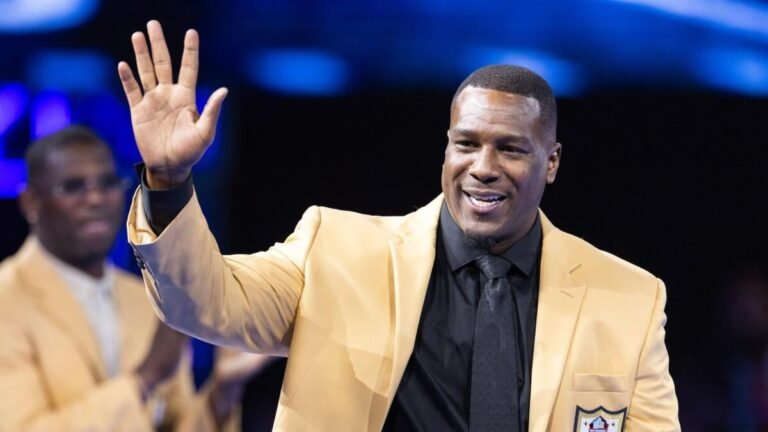On Saturday, one of the greatest tight ends in NFL history was enshrined in the Pro Football Hall of Fame, as former San Diego and Los Angeles Chargers great Antonio Gates was welcomed into the fold on the hallowed grounds of Canton, Ohio.
Gates accumulated 955 catches for 11,841 yards and 116 touchdowns during his 16-year career, figures that rank fourth, fourth and first all time among tight ends, respectively, and 24th, 31st and seventh all time among players at any position. An eight-time Pro Bowler and three-time First Team All-Pro, Gates is perhaps one of the most unlikely Hall-of-Famers in football history.
“It’s like I’m telling a fiction story,” Gates told the Chargers’ official website of his journey. “To tell somebody they can come to the NFL and not play college football but then make the team … and then start … and then make the Pro Bowl and be All-Pro your second year … and then be the all-time touchdown leader … It’s not even a story you can make up.”
As Gates himself noted, he didn’t even play college football. He spent his college career at Eastern Michigan, College of the Seqouias and Kent State playing basketball, averaging 16.5 points and 7.8 rebounds per game while shooting 50% from the field. Gates originally enrolled at Michigan State wanting to play basketball under Tom Izzo and football under Nick Saban, but learned that Saban both wanted him to only play football and wanted to move him to defense, so he transferred away.
At only 6-foot-4, Gates was considered an undersized power forward and more of a “tweener” by NBA scouts despite being an honorable mention for All-American honors while averaging 20.6 points, 7.7 rebounds and 4.1 assists per night as a senior, after having helped Kent State go on a shocking run to the Elite Eight the year before. Rather than enter the NBA Draft, Gates set up a workout with NFL scouts. He went undrafted, but signed with the Chargers as an undrafted free agent.
It didn’t take long for him to make an impact. Even as a rookie, Gates started as a third-stringer but eventually worked his way up the depth chart, and he caught 24 passes for 389 yards and two touchdowns — impressive figures for any rookie tight end during that era, let alone one who hadn’t even played college football.
Starting the next year, Gates went on one of the best runs any player has had at any position. In each season from 2004 through 2011, Gates racked up at least 700 receiving yards and seven receiving touchdowns. Only nine other players have ever had eight such seasons in their entire career. They are Jerry Rice, Randy Moss, Terrell Owens, Marvin Harrison, Tony Gonzalez, Davante Adams, Mike Evans, Larry Fitzgerald and Cris Carter. That gives you an idea of the company Gates keeps.
During that eight-year span, Gates made the Pro Bowl every season, the All-Pro First Team three times and the Second Team twice. He ranked 12th leaguewide in receptions, 11th in receiving yards and second in touchdowns, and checked in third, third and first among tight ends in each of those categories. He teamed first with Drew Brees and then with Philip Rivers and became one of the most dominant tight ends of all time. With LaDainian Tomlinson also leading the way in the backfield, the Chargers finished among the top five scoring offenses in each of those aforementioned eight seasons.
Gates’ basketball background made him an extraordinarily effective weapon in the red zone, where he routinely skied over and dunked on defenders futilely hoping to keep the ball out of his leaping arms. Among tight ends, only Rob Gronkowski had more seasons with double-digit receiving scores — and none of the many luminaries already inducted into the Hall of Fame outscored him during their course of their entire careers.
“We totally exploited our opponents with how we utilized him in the red zone,” former Chargers tight ends coach Tim Brewster said.
“His ball skills were absolutely stupid. Absolutely stupid. He didn’t have any drops either, buddy. His determination when we got down in the red zone, he wanted the ball. He called for the ball. When we put the red-zone installation in every week, he was fired up about it because he’d say, ‘Good, I’m going to score on that one right there.'”
Gates wasn’t the first college hooper to make the transition to the NFL and become a star tight end (that’d be the aforementioned Gonzalez), but he did continue the pipeline that eventually included players like Jimmy Graham and Julius Thomas, among others — a pipeline that teams continue to try to mine to this day, when the opportunity presents itself. If you can find the next Gates, it’s rightly considered a goldmine.
Considering his tremendous accomplishments and his impact on the game, there was no other way for Gates’ story to conclude than with induction into the Hall of Fame. Just because it was an unlikely destination at the start of the journey, doesn’t mean that it could have ended any other way.
